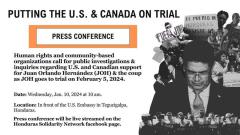Now the big question is how the United States will respond to her policies as president. Castro, a democratic socialist, unseated a right-wing machinery that has been backed by Washington since the 2009 coup that deposed her husband, Manuel Zelaya.
Back then, the Obama administration worked behind the scenes to stabilize the country after the coup. The United States recognized the “victory” of Porfirio Lobo, even though the post-coup dictatorship controlled the election process and deployed the military to the streets; much of the opposition boycotted the election; and many international bodies refused to observe it.
Four years later, in 2013, Castro ran for president with a new center-left party, the Liberty and Refoundation party (Libre), that emerged out of the broad resistance to the coup. Election observers documented intimidation of voters, large-scale vote-buying and widespread fraud at polling places. But Washington nonetheless rushed to endorse a victory by Hernández of the ruling National Party.
Hernández backed the 2009 coup and as president of Honduras’s Congress led a technical coup in 2012 that deposed four out of five members of the constitutional branch of Honduras’s Supreme Court. During Hernández’s presidency, the rule of law continued to degenerate, corruption spread and drug traffickers infiltrated the very top of the military and police.
In 2017, Hernández ran again, this time against a united opposition in which Castro and Libre supported a new center-right party led by Salvador Nasralla, an anti-corruption newcomer. The Honduran constitution strictly forbids presidential reelection, but in 2015 the Supreme Court — handpicked by Hernández — illegally overruled the constitution to allow it.
Although election night returns in 2017 made clear that Nasralla would win, the government stopped counting the votes and a week later declared Hernández the winner. Protests erupted and the police and military killed 22 protesters and bystanders. The Organization of American States called for a new election, but Washington hemmed and hawed and then recognized Hernández’s illegal and fraudulent “victory.” Under Barack Obama and Donald Trump alike, the United States kept standing by its man.
In October 2019, though, the president’s brother Tony was convicted in the Southern District of New York of drug trafficking, money laundering and other crimes. The evidence in his and subsequent trials explicitly implicated the president, who allegedly promised a narco ally that they would “shove the drugs right up the noses of the gringos.”
Is the United States going to continue providing strategic support and cover for corrupt and illegitimate actors?
Castro’s control over Honduras’s democratic institutions could be threatened by its terrifying military and police forces. They’re loyal to Hernández, tight with drug traffickers, long practiced at repressing dissent and capable of anything. Hondurans are rightly worried about a new coup or more complex disruption and violence involving provocateurs, paramilitaries, drug traffickers and gangs. Despite all of this, the United States has continued to fund, train and share intelligence with the Honduran military and police, in the face of powerful congressional opposition. What message is President Biden sending to the Honduran military and police now?
The final, and deepest issue, is if the Biden administration will try to interfere to stop Castro from governing in accordance with the policy mandate she was given. Despite media efforts to cast her as a flaming leftist looking to turn Honduras into Venezuela or Cuba, Castro has reached out the business community and there is no indication that she will eject the United States from the Soto Cano Air Base.
She has promised to restore the rule of law and civil liberties, rebuild the country’s health care and education systems, address mass poverty and stop the repression of Indigenous and Afro-Indigenous communities devastated by extractivist industries. Her agenda is likely to clash with Washington’s, which often sides with transnational capital only interested in profits from dams, mines, garment factories and bananas and is deeply invested in keeping Honduras geopolitically under the U.S. thumb. Washington spends hundreds of millions on “soft power” civil society initiatives that it chooses itself, not the Hondurans through a democratic process. That needs to change. There’s common ground around addressing mass migration, but contradictory approaches to what the root causes are.
Biden now must demonstrate a commitment to the democratic will of the people. Hondurans want to see their aspirations flourish, without interference. Castro might reach out to Washington for support, but a new dynamic must take root based on mutual respect and sovereignty.



